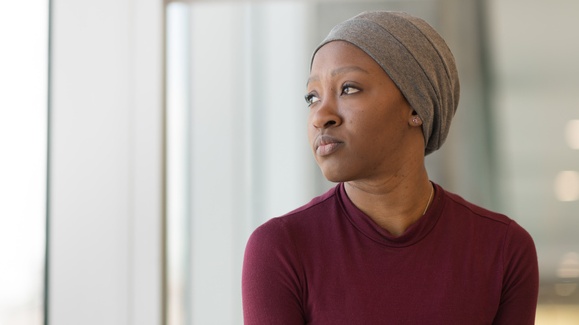A group of Virginia doctors are concerned about the accessibility of coronavirus testing for Black communities.
Because race and ethnicity are not recorded during testing, the doctors are worried Black Americans and other underserved demographics are getting resources at a disproportionate rate, according to BuzzFeed News.
“We know in the US that there are great discrepancies in not only the diagnosis but the treatment that African Americans and other minorities are afforded,” said Dr. Ebony Hilton, an associate professor of anesthesiology and critical care medicine at the University of Virginia. “So I want to make sure that in this pandemic, that Black and brown people are treated in the same way and that these tests are made available in the same pattern as for white people.”
The CDC's database does not include a breakdown of demographics. BuzzFeed notes the Johns Hopkins University database tracks location, age and gender.
”To be fair, I’m not sure that they needed to track the data on race in China,” said Dr. Leigh-Ann Webb. “But in the US, that would be useful information to have in the future because we already know that this virus affects disproportionately people who have comorbidities and African Americans are disproportionately affected by almost every cardiovascular disease that we have here in the United States.”
The doctors discussed how inequalities seen in the Black community are amplified in times like these.
“I don’t want to speak about Black Americans as if we’re all the same, but there’s a lot of reasons not to trust the government to be fair in circumstances like these,” said Dr. Cameron Webb. “Yes, that's a huge question, who has access to those tests … If you're not an NBA player, it might be a little harder for Black people to get access to those tests.”
If doctors were able to know who has been tested, then they could fix the disparities and biases, according to Leigh-Ann. She added that those who aren’t getting tested need advocates.
While testing may not change treatment, considering there is no specific medicine for COVID-19, it may show people how it is spreading in their community, according to Dr. Taison Bell, assistant professor at UVA in the infectious disease and pulmonary critical care divisions.
“I think seeing those dashboards and seeing the cases counted, that does give the community a sense of anxiety, unfortunately, but it does make them more vigilant,” he said.
Civil rights organizations are also concerned about the treatment of Black people during this pandemic.
Color of Change released a statement regarding disparities the Black community is facing as a result of the virus, reports NewsOne.
“This pandemic reveals a terrifying reality — many Americans don’t even know if they are infected with COVID-19 because they are scared to go to the hospital and receive free tests and treatment that may saddle them with debt that could take years to pay off,” Color of Change President Rashad Robinson said. “After years of Republicans, big pharma and major corporations fighting against paid sick leave legislation and medicare for all we are left with a crisis where disproportionately Black low wage workers are continuing to support the public without the health insurance or paid time off that would make us all safer.”
Black communities will be disproportionately affected during the #CoronavirusPandemic. COC members across the nation have created petitions demanding Governors to institute an immediate rent freeze and to stop evictions.
Make your voice heard: https://t.co/gQtL1k5G6d
pic.twitter.com/PGvF5CdOjX— ColorOfChange.org (@ColorOfChange) March 22, 2020
Robinson called on some of the country’s richest figures to help with testing for everyone. He explained that after this pandemic, people will be returning to economic hardships.
“Billionaires like Jeff Bezos, Mark Zuckerberg, and Bill Gates, who have made billions from Americans, have the means to provide testing for the entire country, several times over,” he said. “As we face down a potential recession, we also must ensure that our government bails out the working people and consumers who will feel the brunt of this recession, instead of executives and industries who have been hoarding their profits since Trump’s tax cuts took effect.”
He also worries that this outbreak is affecting voting as well as people who are incarcerated.
All too often the black communities are relegated to last in line when it comes to repairing the damage done. While #Covid19 does not discriminate, the impact is disproportionately felt within our communities and we will not be silent until #EquitableRelief is accomplished.
— NAACP (@NAACP) March 22, 2020
The NAACP released a statement listing ways the virus is impacting communities of color as well as 10 policy recommendations in order to minimize the impact, including highlighting a lack of accessibility to testing.
The number of infected people in the U.S. has risen, as known COVID-19 cases have reached 32,000 as of Sunday, March 22, according to CNN.
In the early days of the outbreak, several joked that Black people were not able to contract coronavirus.
So NONE of these Corona Virus cases have been black people?! LEMME FOUND OUT WE IMMUNE. It’s the least God can do after slavery.
— key. (@keywilliamss) March 9, 2020
Actor Idris Elba urged everyone to stop spreading such misinformation once he tested positive for COVID-19, as Blavity previously reported.
"There are so many stupid, ridiculous conspiracy theories about Black people not being able to get it. That’s dumb, stupid," he said while on a live Twitter Q&A.
